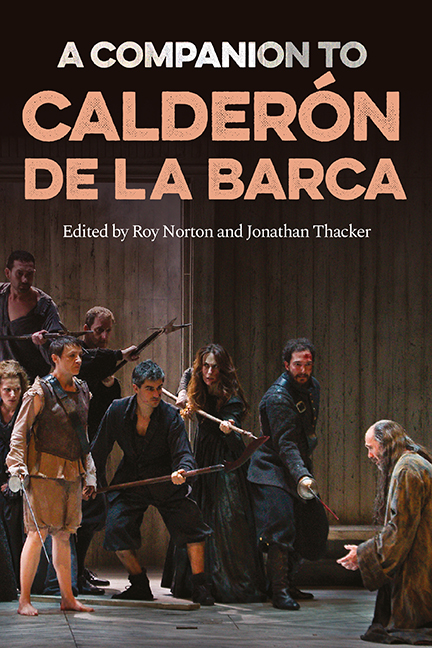Book contents
- Frontmatter
- Dedication
- Contents
- List of Illustrations
- List of Contributors
- Acknowledgements
- List of Abbreviations
- Introduction
- 1 Biography and Context
- 2 The Calderonian World
- 3 The Playwright’s Craft: Calderón and the Great Theatrical World of Early Modern Spain
- 4 La vida es sueño
- 5 The Honour Plays of Calderón
- 6 Calderón, the Comedian
- 7 Mythological Court Spectacle Plays
- 8 Religious comedias
- 9 Calderón’s ‘Sacramental, Allegorical and Historical’ autos
- 10 Calderón’s graciosos
- 11 Calderón and Visual Art
- 12 The Staging of Calderón’s Theatre
- 13 Calderón’s European Reception from Romanticism to the Twentieth Century
- 14 The Reception of Calderón in the Hispanic World
- Appendices
- Consolidated Bibliography
- Index
- Tamesis • Companions
4 - La vida es sueño
Published online by Cambridge University Press: 07 October 2022
- Frontmatter
- Dedication
- Contents
- List of Illustrations
- List of Contributors
- Acknowledgements
- List of Abbreviations
- Introduction
- 1 Biography and Context
- 2 The Calderonian World
- 3 The Playwright’s Craft: Calderón and the Great Theatrical World of Early Modern Spain
- 4 La vida es sueño
- 5 The Honour Plays of Calderón
- 6 Calderón, the Comedian
- 7 Mythological Court Spectacle Plays
- 8 Religious comedias
- 9 Calderón’s ‘Sacramental, Allegorical and Historical’ autos
- 10 Calderón’s graciosos
- 11 Calderón and Visual Art
- 12 The Staging of Calderón’s Theatre
- 13 Calderón’s European Reception from Romanticism to the Twentieth Century
- 14 The Reception of Calderón in the Hispanic World
- Appendices
- Consolidated Bibliography
- Index
- Tamesis • Companions
Summary
La vida es sueño [Life is a Dream] is the most famous play of the Spanish Golden Age, and one of the most famous in world drama. The foremost modern theorist of Baroque tragedy, Walter Benjamin, regarded Calderón's works as ‘the supreme form of this European theatre’ and remarked:
Nowhere is this clearer than in La vida es sueño, where we have a totality worthy of the mystery-play, in which the dream stands over waking life like the vault of heaven […] the perfect form of the Baroque Trauerspiel. The very precision with which the ‘mourning’ [Trauer] and the ‘play’ [Spiel] can harmonize with one anoth-er gives it exemplary validity.
Benjamin was echoing the Romantic apotheosis of Calderón's dramaturgy initiated by August Wilhelm Schlegel, which helped re-establish Spain's Golden Age dramatists at the heart of the European canon after the attacks of the neo-classicists. But La vida es sueño always headed the list, from the moment of its first appearance. We know of seventy editions up to 1800 (twelve extant in single copies only, fifteen deducible but lost; it stands to reason there were more), making it the most-printed play of its age, besides various French, Dutch, Italian and German seventeenth-century translations and adaptations (parodies, operas, etc.), and scores of records of performance in all these languages as well as Spanish. Even during its nadir in the neo-classical era the play's hegemony both on stage and in all formats of print was, in Germán Vega García-Luengos's word, ‘overwhelming’ (abrumadora). Up to then Calderón ranked far above Shakespeare in the barometers of European taste; even in our own age there has appeared at least one new edition or translation of La vida es sueño every year since 1973.
Spain's most famous drama, then; but also most notorious. If La vida es sueño has been considered the summit of Baroque theatre, it has by the same token been presented as embodying everything that was wrong with the Baroque. Voltaire described Calderón's oeuvre as a ‘dung-heap’ (fumier) of demented barbarism and unbridled absurdity, offensive to all civilised taste and even more primitive in its technique and outlook than Aeschylus. He made no pronouncement on La vida es sueño, but his followers soon singled it out.
- Type
- Chapter
- Information
- A Companion to Calderón de la Barca , pp. 72 - 89Publisher: Boydell & BrewerPrint publication year: 2021



